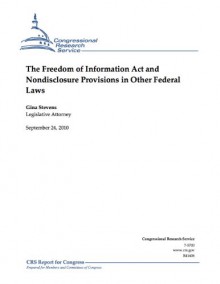The Freedom of Information Act and Nondisclosure Provisions in Other Federal Laws
Congress continues to consider how to balance the federal government’s growing need for sensitive or confidential business information, the public’s right of access to information about government activities, and the private sector’s interest in keeping its sensitive or proprietary information...
show more
Congress continues to consider how to balance the federal government’s growing need for sensitive or confidential business information, the public’s right of access to information about government activities, and the private sector’s interest in keeping its sensitive or proprietary information protected from public disclosure. In enacting the Freedom of Information Act (FOIA), 5 U.S.C. § 552, Congress sought to balance the right of the public to know and the need of the government to protect certain information. FOIA’s broad provisions favoring disclosure, coupled with the specific exemptions, represent the balance Congress achieved. The federal FOIA is an information access statute enacted in 1966 that applies to agency records of the executive branch of the federal government. FOIA requires that certain types of records be published in the Federal Register, that certain types of records be made available for public inspection and copying, and that all other records be subject to request in writing.Exemption 3 of FOIA provides that in order for a federal law other than FOIA to qualify as a withholding statute, it must require that information be withheld or permit information to be withheld by particular statutory criteria or permit information to be withheld based upon a statutory reference to particular types of information and must specifically cite to Exemption 3. Courts have taken different approaches over whether the withholding criteria in nondisclosure statutes should be construed narrowly, consistent with FOIA’s strong preference for disclosure, or broadly, consistent with the deferential standards of administrative law.Congress has enacted legislative exemptions from FOIA to provide assurance that private information submitted to government agencies will not be disclosed or will only be disclosed in limited situations. Generally, the legislation has exempted covered information from disclosure under FOIA. Congress has recognized that some situations do not fall within FOIA’s framework. The proliferation of legislative exemptions from FOIA has resulted in widespread concern that information that needs to be shared will be inappropriately withheld. To respond to these concerns, Congress enacted the OPEN FOIA Act of 2009, P.L. 111-83, which requires that when Congress provides for a statutory exemption to FOIA, Congress must state its intention clearly.During the 111th Congress, two legislative exemptions from FOIA have been particularly controversial. The first, The Protected National Security Documents Act of 2009, Section 565 of P.L. 111-83, was enacted in response to litigation under FOIA to obtain photographs depicting the alleged mistreatment of detainees in Iraq and Afghanistan. The second, a provision in the Dodd- Frank Wall Street Reform and Consumer Protection Act, Section 929I of P.L. 111-203, grants an exemption from FOIA to the Securities and Exchange Commission (SEC) for certain information received from entities it regulates, or information used for other regulatory and oversight activities. The House Financial Services Committee held a hearing on September 16, 2010, on the Dodd-Frank FOIA exemption. The Senate passed S. 3717, sponsored by Senator Leahy, by unanimous consent on September 21, 2010. S. 3717 struck Section 929I of the Dodd-Frank Act, and expressly provides that for purposes of Exemption 8 of the FOIA, the SEC is an agency responsible for the regulation or supervision of financial institutions; and any entity for which the commission is responsible for regulating, supervising, or examining is a financial institution. Exemption 8 provides that FOIA does not apply to matters contained in or related to examination, operating, or condition reports prepared by, on behalf of, or for the use of an agency responsible for the regulation or supervision of financial institutions. The House passed S. 3717 on September 23, 2010. This report will be updated as warranted.
show less

